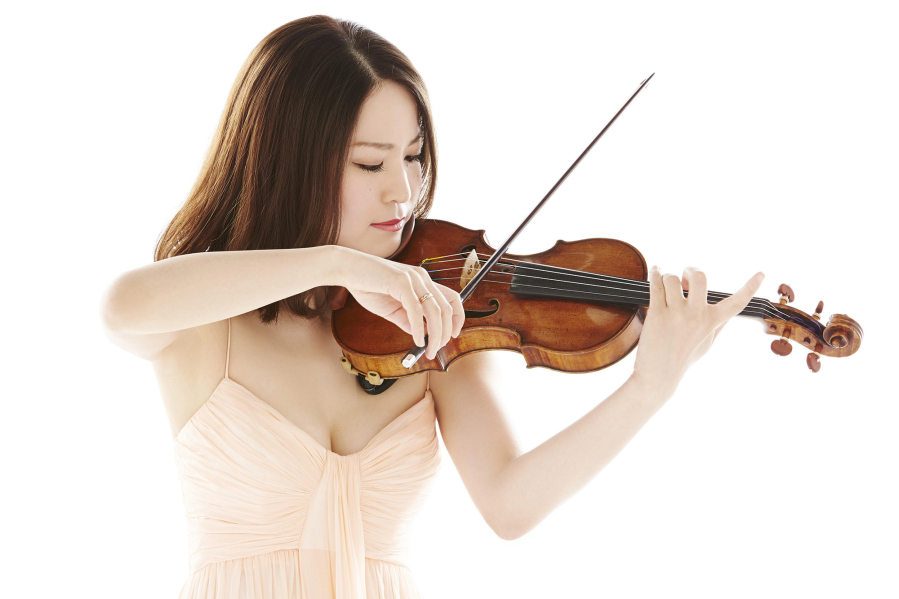The Vancouver Symphony will open its 38th season with an all-Russian program that will feature acclaimed Japanese violinist Mayuko Kamio playing Tchaikovsky’s Violin Concerto, one of the most beloved in the repertoire.
Kamio, 30, has won a number of violin competitions, including the gold medal of the 2007 International Tchaikovsky Competition. Yes, that’s the same competition that Van Cliburn won in 1958 at age 23. So when you do the math, you’ll realize that Kamio won it when she was just 21.
Like other prodigies, Kamio started early with music lessons, but hers had a slight twist. She began with the piano when she was 3 years old but didn’t take to it.
“I totally disliked playing the piano,” Kamio said. “So my grandfather suggested that I should try out the violin instead, and on the day I received my first violin, I made a stage myself with a table and pillows, and made everyone listen to me all day. I was 4 years old.”
If You Go
• What: Vancouver Symphony season opener, featuring Mayuko Kamio in Tchaikovsky’s Violin Concerto.
• When: 3 p.m. Saturday and 7 p.m. Sunday.
• Where: Skyview High School Concert Hall, 1300 N.W. 139th St., Vancouver.
• Cost: $50 for reserved seats, $37 for general admission, $32 for seniors and $10 for students.
Kamio became so accomplished with the violin that she debuted as a soloist in Tokyo at age 10 under the baton of Charles Dutoit in a concert that was broadcast on television. But she takes nothing for granted and still practices about three hours a day. She first performed the Tchaikovsky Violin Concerto when she was 12 years old. Since then, she has performed the concerto in public almost 80 times.
“I have always liked this concerto because it is somehow very simple,” Kamio said. “It is very indulgent. It lets you listen to good, mellow melodies until you are totally full and satisfied.”
Tchaikovsky wrote the concerto after recovering from a nervous breakdown caused by a disastrous marriage to a former student, Antonina Milyukova. He sketched out the piece in 11 days and finished the scoring two weeks later.
Some critics hated the work. One wrote that “Tchaikovsky’s Violin concerto is an accumulation of discords, confused climaxes and dressed-up trivialities, covered by the national flag of the most barbarous sort of Russian nihilism.”
“I think that it is particularly interesting that Tchaikovsky was often criticized in Russia for being too European,” Kamio said, “though this piece was criticized in Europe for having a ‘Russian stink.’ ”
Those views rapidly disappeared as the work gained popularity because of its brilliant lyricism, elegiac slow movement and dazzling finale. Within a few years of its premiere in 1881, it entered the pantheon of the most famous violin concertos of the Romantic era, joining those of Beethoven, Brahms, Mendelssohn and Bruch.
Kamio is familiar with all of the great violin concertos and plays them regularly.
“The number of concertos I play depends on the season,” Kamio said. “In some months, I have to play a different concerto every week. In some seasons, I play Tchaikovsky all the time.”
She has released four recordings on the Sony and BMG labels, including a recording of the Tchaikovsky Violin Concerto with the Halle Symphony Orchestra under Thomas Sanderling. Kamio plays the 1735 “Sennhauser” violin that was made by Joseph Guarneri del Gesu. It is sponsored by The Stradivari Society of Chicago.
Another major Tchaikovsky piece on the program is his Sixth Symphony, which is also known as the “Pathetique.” It was the last symphonic work that he completed, and he conducted its first performance in 1893. The musical world was then jolted when Tchaikovsky died nine days later, the victim of drinking a glass of unboiled water in St. Petersburg where many cases of cholera had been reported. Tchaikovsky was only 53 years old, at the height of his creative powers, and famous far beyond his native Russia. Scholars still debate whether his death was purely accidental or if he took his life because of his homosexuality.
The Sixth Symphony is an emotional roller coaster that takes audiences to dizzying heights and bottomless depths. The final movement, however, is slow and mournful and has an overwhelming sense of despair. Audiences at first didn’t know what to make of it, but its tragic music is thoroughly gripping and continues to resonate with listeners today.
The Overture to “Ruslan and Ludmilla” is one of the best curtain-raisers ever written. Mikhail Glinka imbued it with Rossini-like energy and a distinctly Russian combination of earthy exuberance and heroic feeling. You don’t have to know anything about the opera or the epic poem by Pushkin that it is based on. The music should sparkle under the dynamic conducting of Salvador Brotons, who will be starting his 26th season with the Vancouver Symphony.



